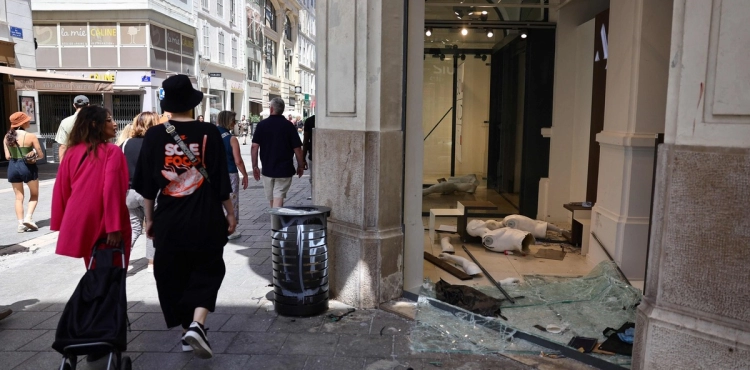Armando Varela approaches a discount store in Aulnay-sous-Bois in the northern suburb of Paris, but turns back. Since the violent riots that shook France two months ago, the store remains closed, like many small stores in the country.
"This is really annoying, so I have to go somewhere else, which requires more fuel," the retired man said in front of the Aldi store, which was vandalized and looted during the night riots that followed the killing of a 17-year-old on June 27 by a policeman during an inspection near Paris. And time.”
The scenes showing the police officer shooting Nael M. from a very close range sparked a wave of anger in the country, where the killing of young men from immigrant families at the hands of the police often sparked riots in major cities.
Over the course of six consecutive nights, the situation flared up in several cities, and rioters targeted public administrations and stores. The government estimates that more than 750 official buildings were damaged, while about a thousand shops were vandalized or looted.
Two months have passed since these events, and the doors of many of these stores are still closed. “The people of the region are paying the price,” said 26-year-old Aminita Key, who was met by Agence France-Presse in Aulnay-sous-Bois, in the poorest department of Seine-Saint-Denis in mainland France.
The municipality of this Parisian suburb reports that the Aldi store will reopen its doors on September 6th. However, retiree Rachida Ait Chaouch complains, “We waste the whole day buying something.”
A few steps away, the doors of the post office also remain closed “until further notice,” according to a note stuck to the glass door with the address of another post office located four kilometers away.
The Postal Service told Agence France-Presse that 47 of the 130 post offices damaged in France during the riots are still closed “due to the destruction caused to them,” while their total number in the country amounts to seven thousand.
During the night violence, unrest extended to areas previously unaccustomed to. In Montargis, in the rural Loiret department in the center of the country, scenes of vandalism on the commercial street shocked the people of the city.
Here too, two months after the unrest, the repercussions “are still visible and we will continue to use wooden doors through September,” says Vivian Malle, head of the city’s merchants’ union, explaining that 114 establishments were damaged.
Male, who owns clothing stores, adds that in July, “we achieved revenues that were 20 to 30 percent less than what is usual for this period of the year with the beginning of the sales season, which is the most important,” expressing her regret at the slowness of insurance companies and the lack of aid from the state.
At the end of July, Parliament passed an accelerated law aimed at facilitating reconstruction after the riots, but problems continue.
Francis Palombi, president of the Federation of French Merchants, which represents 450,000 commercial establishments in France, says that 10 to 15 percent of the stores that were targeted have not yet been able to reopen their doors due to “problems related to insurance or support.”
He added, "The situation was more severe at the level of some professions that were heavily targeted, such as tobacco sales offices and clothing merchants."
In Saint-Etienne, in southeastern France, the cost of damage to Christophe Gavelle's store, which sells the famous Lacoste brand, amounted to "400,000 euros." The store owner was forced to suspend the work of seven of his employees, but he hopes to open his store again in mid-September.
In Auvernier-Rhône-Alpes in the south-east of the country, a file has been submitted every two days since the adoption of the aid mechanism.
In the southernmost region of Provence-Alpes-Côte d'Azur, a fund worth ten million euros was created to "respond to emergency situations."
Financial assistance ranges from five thousand euros to compensate for lost profits to ten thousand euros if stores are damaged.
In Marseille, in one of the streets most affected by the riots, movement has returned almost to normal, but the scars are still visible. Part of the facades is still hidden behind wooden panels covered with graffiti and anti-police phrases.












